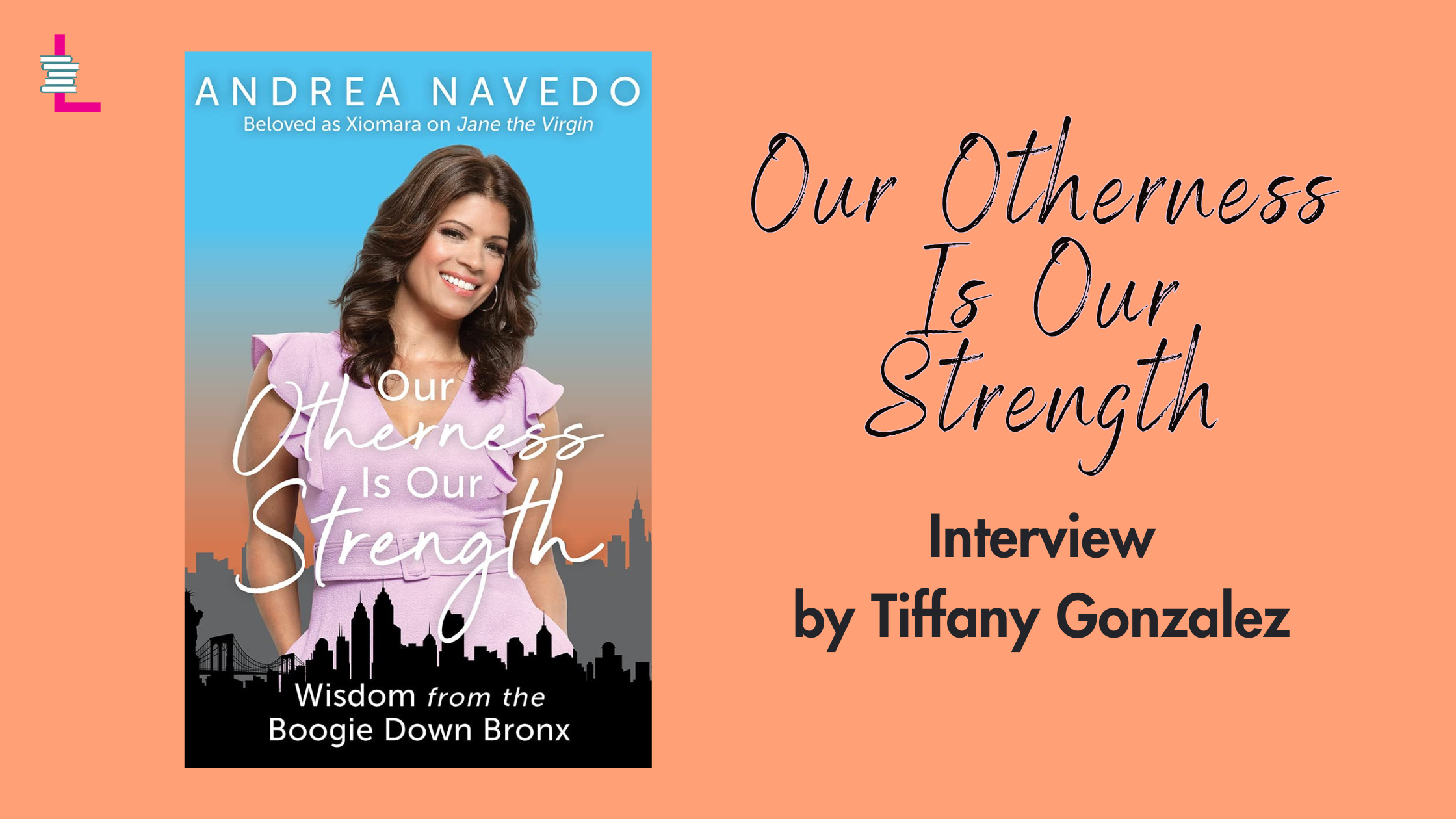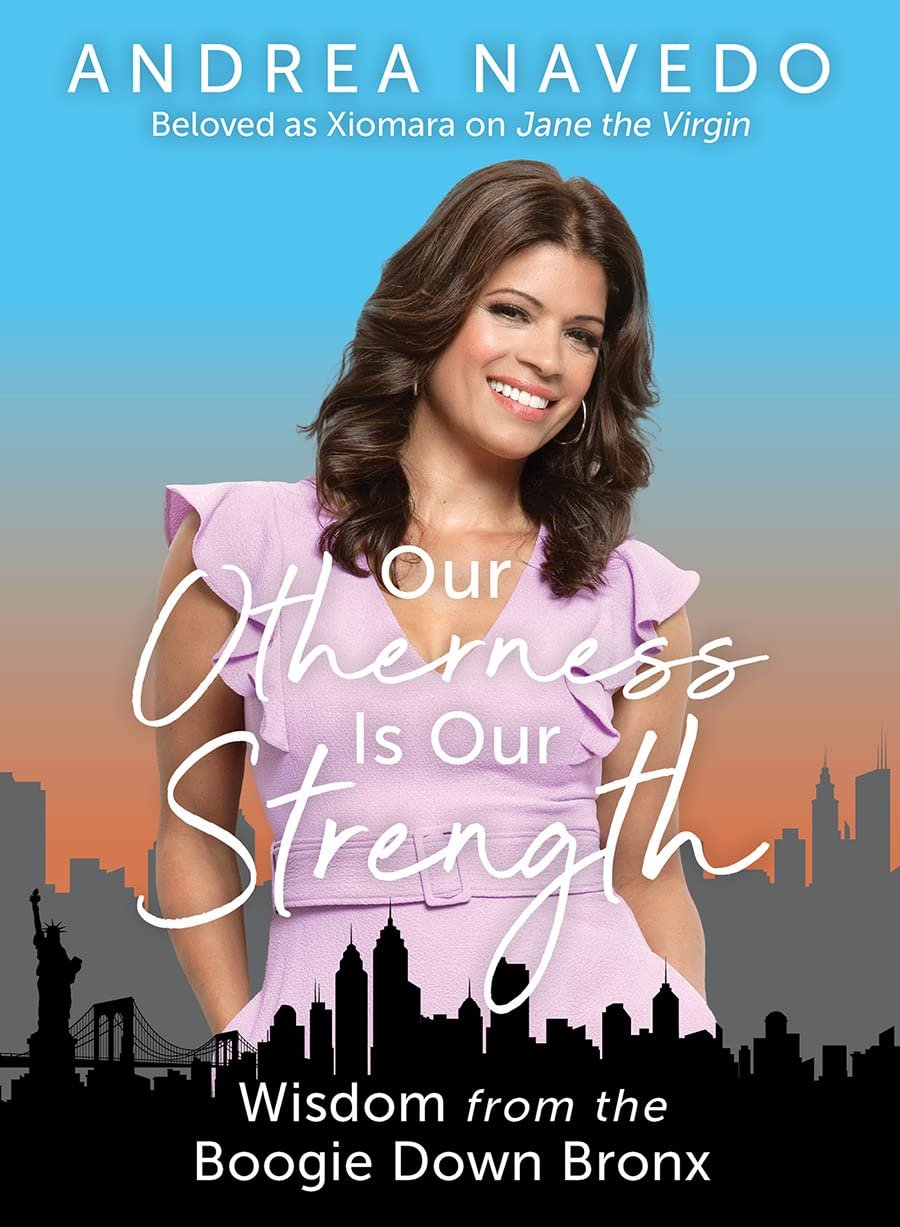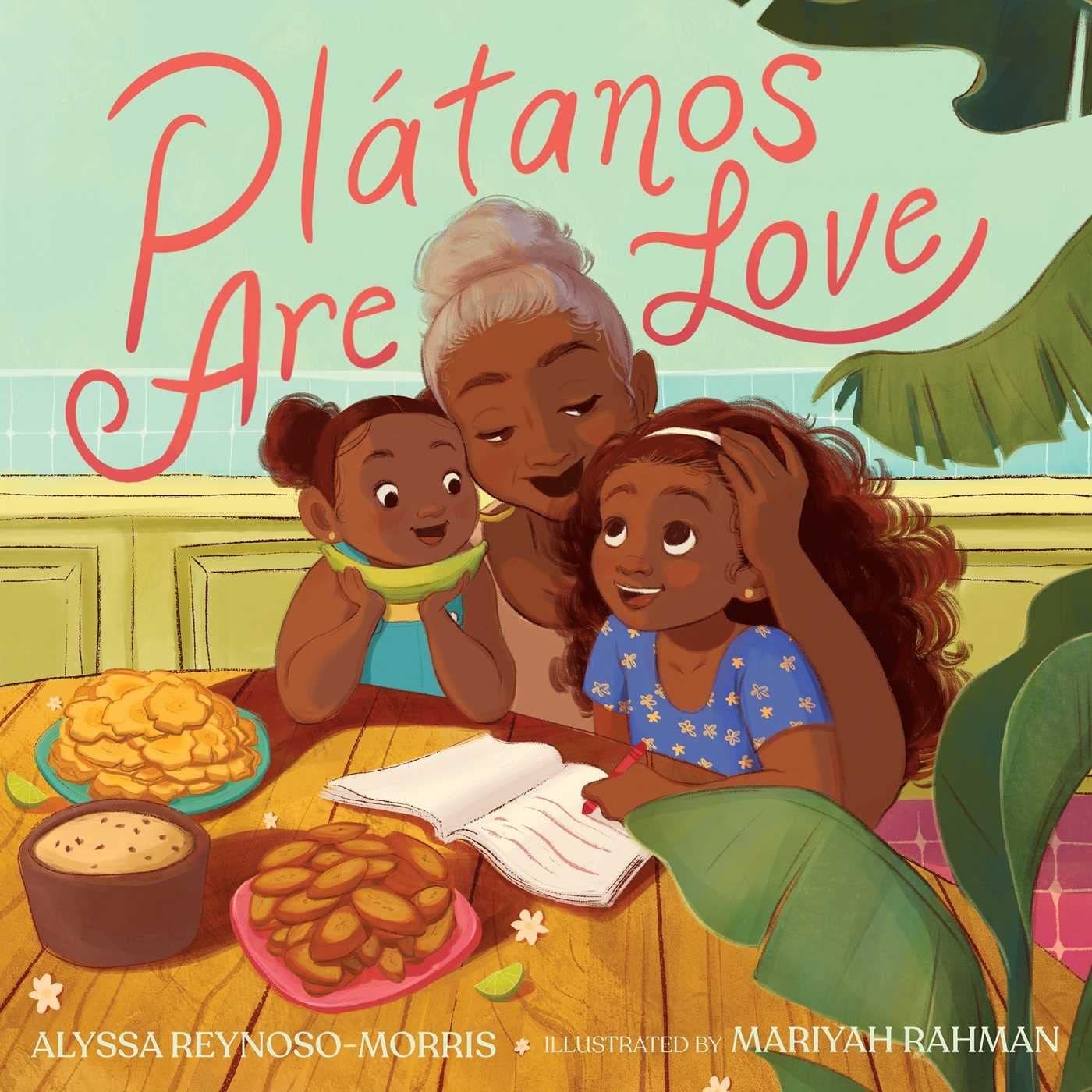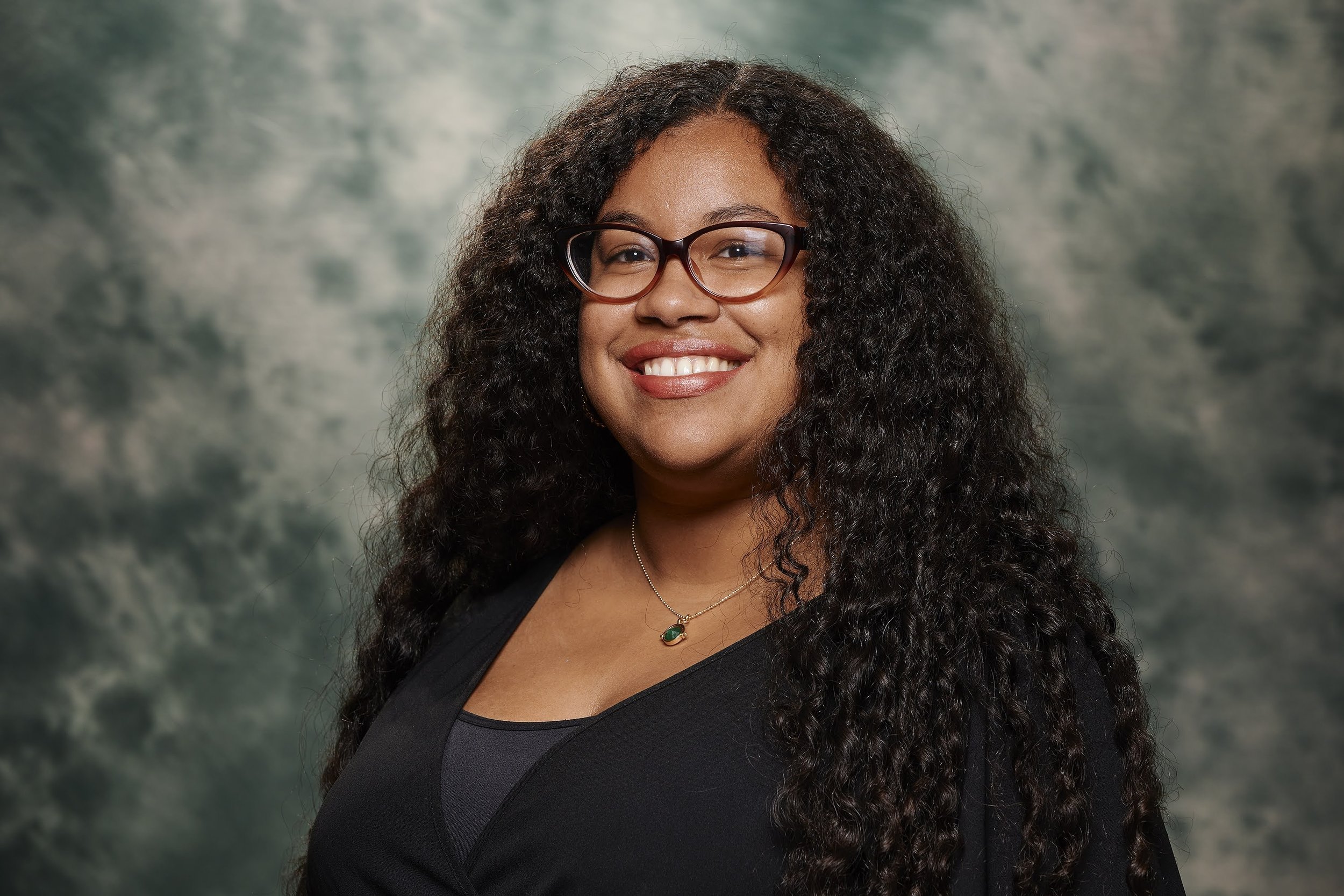In her book Our Otherness Is Our Strength: Wisdom from the Boogie Down Bronx, Andrea Navedo, known as Xiomara from the acclaimed CW series Jane the Virgin, reminds us that “When you show up for you, amazing things happen.” A short but powerful book, filled with lessons on how to thrive in our “otherness.”
Expanding on her commencement address to her former alma mater DeWitt Clinton High School as well as other speeches that she has given, Navedo proudly highlights how her upbringing in The Bronx has made her who she is today. From learning how to stand up for herself, to further exploring her culture, to becoming the representation she wished to see on television, Our Otherness Is Our Strength is an invitation from Navedo to believe in yourself.
Each chapter begins with a quote, wisdom that gets reflected throughout each unique story, and as we slowly get more intimate with Navedo, we start seeing that there’s no limitations to what one can achieve if you believe in yourself.
On behalf of Latinx in Publishing, I asked Navedo a few questions about the journey that led to writing her book, the importance of Latinx representation in the media, exploring your cultural history and more.
Tiffany Gonzalez (TG): I'm a huge Jane The Virgin fan and was excited to learn that you had a forthcoming book. I was also even more excited to learn that you were from the Bronx, as I spent my childhood there, until I was 13 years old. How did the idea for this book come into fruition. And why did you decide to focus on your upbringing and the Boogie Down?
Andrea Navedo (AN): I wrote this book because while I was on Jane the Virgin I was invited to give the commencement speech at the high school I graduated from. I had been wanting to write a book for a while. I wasn't sure what it was going to be about, but I felt like I had some ideas to share. And so when I got the invitation to give the commencement speech at Dewitt Clinton Highschool in The Bronx, I thought, Wow, here I am! It's 30 years later. What am I gonna say to these kids? I was one of those kids sitting in those seats. The response from the speech was so positive that I wanted to share what I told them, tell stories they related to, on a bigger scale. That’s where the idea for the book came from.
The other reason why I have the Bronx in the title is because when I was growing up, I felt like “the other”—one who's not part of the mainstream, not accepted. I felt that being from The Bronx was one of the things that made me “other.” Also, the reputation The Bronx has worldwide is as dangerous, a bad place. I wanted to shine a light on the humanity that is in that borough and show that good can come out of The Bronx, that wisdom can come out from there—and places like it. I wanted to focus on my upbringing to show the humanity of my community.
“I may not have gotten to see myself reflected on television, but I got to be the person to help create that reflection, that image.”
TG: OK, I grew up in the 90’s/2000s and watched a lot of TV in Spanish and English. It never dawned on me that no one ever looked like me until much later in life. It's one of the reasons that I love Jane the Virgin. I not only saw myself but my family in the characters. Can you talk more on why it's important for characters like Xiomara, to exist on television and your thoughts on the future of Latinx people in the media?
AN: I was aware, when I was growing up that I wasn’t being reflected on television and film. As a little girl, I had a dream of being an actress. I never shared it because it seemed like a pie-in-the-sky dream, unobtainable, especially because I didn't see my own images reflected on television—at least not in a positive way.
I’m a member of the Geena Davis Institute for Gender in Media. Her message is “If she can See it, she can Be it.” What she tries to promote are more female images in front of the camera, more female lead characters and she's also expanded that agenda to bring in more diverse characters, as well. I believe that motto is true, that if she can see it, she can be it. Unfortunately, I didn't see it. So it was really hard for me to believe that I could “be it.” I'm glad that I tried acting as a career anyway, because I got to be one of the people who have represented people like me and have created an image that could potentially inspire a younger generation of “others.” I may not have gotten to see myself reflected on television, but I got to be the person to help create that reflection, that image. That's really important to me. Jane the Virgin was the show that I needed when I was growing up. I needed that show. It would have meant so much to me. But the prize came later on for me, when I became an adult. I got to be the person to bring that gift, not only to my family, (because the women in my family didn't get to see it either) but to other generations of Latinos, people of color and a diverse background of so many cultures that related to Jane the Virgin. It is not just being Latina. That whole immigrant story makes sense to so many cultures in the United States and globally. I'm proud and happy that I got to be one of persons who helped tell that story.
TG: In the book, you discussed negative portrayals of The Bronx in the media, throughout your upbringing. Do you think those portrayals are different today? If so, how? What is something positive you wish for people to know about The Bronx?
AN: There’s definitely way more positive images of Latinos or people of color in the media now. That's because so many people have been speaking up for years, pointing out the discrepancy in the population at large versus what you see on the screen. There was a huge discrepancy there that makes a certain segment of the population feel left out, excluded, “othered.” That's really where my book comes from: feeling like “the other” but realizing that being “the other” and all the challenges that come along with that can be the very thing to help you succeed. Those challenges are what make you stronger. It made me strong enough to handle a very challenging career as an actor. Entertainment is still a very, very challenging career.
People may know that The Bronx just celebrated the 50th anniversary of Hip Hop, which was born in the Bronx! Hip Hop is a global, multibillion dollar industry. Who would have thought that those black and brown kids from the Bronx had anything to offer the world? And look at what they offered?! Hip Hop is not only for black and brown kids anymore. It's for all cultures. It has exploded. It’s been an amazing way of expressing the challenge of being “the other” through music and dance. It's resonated with so many people and so many cultures because everyone has some sort of otherness. Everyone has some challenge and hip hop is a way of saying F you to the Big System and carving a way for oneself. Another multibillion dollar influence is Salsa music. Salsa also comes from The Bronx. Many think that salsa music came from Puerto Rico or from Cuba. It has its influence from there but the birthplace of salsa music is The Bronx. But no one has to do something amazing or incredible in order to be validated. I want people to know that the people living in The Bronx or a place like The Bronx are human beings with dreams, wishes, wants, goals. These are people who care for their children, who want them to do well in the world, who want their kids to be safe and contributing members of society.
TG: I Absolutely loved the retelling of your time in Puerto Rico with your grandmother. I laughed when I read how much Sancocho you ate. I have to ask if Sancocho is still a go for you?
AN: Ah Sancocho, I hardly ever eat because it's such a hearty stew and there's so much salt in it. I try to avoid soups because I’m watching my blood pressure. Fun, I know. . . If I'm given the opportunity, I would definitely have some as a treat, but Sancocho is so delicious and filling, I wouldn’t need to eat for the rest of the day!
“. . . learning the language, learning about your history, and traveling to your country of origin, really help give you a sense of belonging. ”
TG: We are in a pivotal time, people are exploring their histories more, doing the research they weren’t assigned growing up, fighting back the unjust systems trying to erase our past. What is your advice to those on this crucial journey?
AN: I would say to explore your heritage, your background, what your genetic makeup is. Learn where your parents and grandparents are from, where your great grandparents are from, because it will give you a sense of identity and belonging. I needed that growing up. As a kid, I knew I was Puerto Rican, but I didn't really know what that meant. Puerto Rico was just some island far off I had never been to. It sounded cool. I was an American, although I didn't feel American because I didn't look American. I didn't look like the people on TV. I kept asking myself, “Who am I and where do I belong?” Then I had the opportunity to go for a month to Puerto Rico to stay with my grandmother and have Sancocho and roast coffee beans from the family farm out in the sun, on the patio. I had the freshest, best coffee I've ever had in my entire life. That gave me a sense of identity and belonging. Then, as an adult, I decided to learn Spanish because I did not grow up speaking Spanish. I was technically second generation in the States and so even though my parents speak Spanish, they would always speak to me in English. They grew up in a time where assimilation was the most important thing. You had to assimilate into the American culture and on some level, you had to reject your family culture. There was a lot of racism that my parents experienced, especially my mom because she had brown skin, like me. My father had fair skin, blue eyes so it was a little easier for him to navigate the world, but for my mother, it was harder. As an adult, I started to learn Spanish, especially because when on that trip to Puerto Rico, I didn't know how to speak with my extended family members. I couldn't understand them and they made a comment that it was a shame that I didn't speak Spanish. I felt very embarrassed and said, “Hell no! When I get older I'm going to learn how to speak Spanish.” So when I graduated college I went to Mexico. It was cheapest of all those Spanish abroad Programs. I had some money saved up. I went to Mexico for three months, attended a Spanish school, lived with a family who didn't speak English and I learned so much during that time. After that, I studied in Manhattan at a really cool school that doesn't use textbooks. They teach in a way that is very natural to how we learn to speak languages. I also went to Cuba for a month to the University of Havana. I’ve done all this to claim my identity because learning the language, learning about your history, and traveling to your country of origin, really help give you a sense of belonging.
“Writing this book gave me the opportunity to look at where I was from and to see how far I had come.”
TG: Could you share some words of wisdom to those embracing their “Otherness?”
AN: Write down the negative experiences or feelings you've had growing up or even in your adult life. What were the challenges your otherness created? For me, the sense of being Latina and brown from The Bronx, made me feel like I was less than, not valuable enough to be an actor or to be a featured actor. But I persevered anyway. I pushed against that, and those things made me stronger. I lived in a tough neighborhood, was bullied, but I used that to make myself stronger. Back to your list. Write down your challenges, especially those that came with your otherness. Then list the achievements in your life. So often we focus on what we didn’t get and what was bad and wrong that happened to us and never stop to say, “Well wait, look what have I overcome and achieved.” That’s what was so great about writing this book. Writing this book gave me the opportunity to look at where I was from and to see how far I had come. Those are my words of wisdom. Do that exercise and see how your otherness has strengthened you.
TG: Finally, what can we expect next from you?
AN: *The audio version of the book will be coming out very soon. I'm actually going into the studio to record the audio book, so that's what's next for me! My next goal is to work on a TED talk or two, but nothing is in stone yet. For those who’ve never heard of a TED Talk, it’s a global organization that promotes speeches to help share ideas and get the word out to millions of listeners.
*The audio is now available via audible.
Andrea Navedo is a Bronx-born-and-raised Puerto Rican American actress best known for her role as Xiomara, a complex and genuine Latina, on The CW’s series Jane the Virgin, for which she received critical acclaim. She is dedicated to various charities, including A Place Called Home in South Central Los Angeles, and the Fresh Air Fund in New York City. Navedo has a passion for self-improvement, growth, and healing, and through her experiences seeks to help those who see themselves on the outside looking in. She and her family divide their time between their homes in Toronto and Connecticut.
Website: AndreaNavedo.com
Instagram: @andreanavedo
Facebook: /AndreaNavedoOfficial
Twitter: @andreanavedo
Tiffany Gonzalez is the Marketing Manager at Astra House and the Board Treasurer for Latinx In Publishing. She previously worked in Production at HarperCollins Publishers. She has worked on the Publicity and Marketing campaign for Dreaming of You by Melissa Lozada-Oliva and on the Marketing campaigns for Becoming Abolitionists by Derecka Purnell, National Book Award Finalist The Town of Babylon by Alejandro Varela and Y/N by Esther Yi. She was a 2022 Publishers Weekly Rising Star Honoree. She has earned her Bachelors and Master's degrees from Rutgers University - New Brunswick. She is Dominican-American and fluid in Spanish. You can follow her on Instagram @wandering_tiff_ and on Twitter @wanderingtiff or visit her website wanderingtiff.com.














